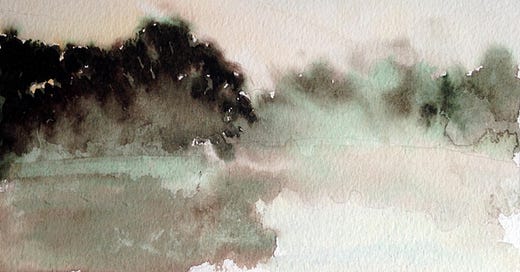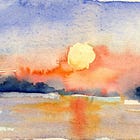It is in dying that we are born to eternal life.
This is the final verse of a multi-part series considering the Prayer of St. Francis. The first post considers prayer, and includes an index to the rest.1
It amuses me to reflect on the final verse on my birthday, in this season of another celebrated birth. My Catholic upbringing taught a literal version of eternal life. The son of God was born, lived among us as a man, taught some things, then died to take away our sins. “God so loved the world that he gave his only begotten Son,” so the story goes. Christ gave his life to give humans eternal life—in a place called Heaven.
What if we pan out beyond the miracle of such a birth? Could the eternal be a lens on my individual life—my own miraculous birth, my history and culture and beyond to ecosystem and planet and universe? Could I delve in the other direction to explore what lies beneath the surface of my skin, in those interior realms of thought and belief and intuition, and deeper still to shadow and unconscious, into the place before thought and individuality?2
“There is a basin in the mind where words float around on thought and thought on sound and sight. Then there is a depth of thought untouched by words, and deeper still a gulf of formless feelings untouched by thought.” ~ Zora Neale Hurston, from Their Eyes Were Watching God
Dying to old habits and ingrained thoughts is another interpretation of the verse, with its promise of transformation and renewal. Sir James Frazer’s classic work, Folklore in the Old Testament, compares “primitive” sources of Old Testament stories. Stories of shedding skins are associated with immortality and humans are included in that history.3
Shedding skin helps me to encounter the outer world in ways that are fresh and alive. Dead skin cannot feel. It hardens into armor that cuts me off from experiencing the world in all its wonders.
The Knight
The knight rides forth in coal-black steel
into the teaming world.
Outside his armor everything is there: sunlight and valley,
friend and foe and feast,
May, maiden, forest and grail,
and God himself in a thousand forms
to be found along every road.
But inside the armor darkly enclosing him
crouches death. And the thought comes
and comes again:
when will the blade
pierce this iron sheath,
the undeserved and liberating blade
that will fetch me from my hiding place
where I’ve been so long compressed –
So that, at last, I may stretch my limbs
and hear my full voice.
~ Rainer Maria Rilke, from Book of ImagesThe eternal is a place outside the reach of time, a place carried within each of us. Zora Neale Hurston’s basin is a gulf, an ocean of formless feelings. Is St. Francis inviting me to set aside mortal thought and concept to access the eternal within me? Meditation and prayer are internal journeys, ways to touch and enter the eternal that flows within and through my depths.
It is in dying that we are born to eternal life.
I like the circularity of the words dying, born, and eternal. They form a wheel that is always turning. We’re called to notice that our lives are not linear, as in beginning, middle, end. We are as much a part of the cycles on earth as sunrises, seasons, and storms.
“We shall not cease from exploration, and the end of all our exploring will be to arrive where we started and know the place for the first time.” ~ T.S. Eliot, from “Little Gidding,” the “Four Quartets”
Circles and cycles are the way of this world, as mandalas, rose windows, and labyrinths remind us. If the eternal had a form, it would be the circle. A circle has no beginning and no end. If it had a color, it would be white, the presence of all color. If it had a sound, it would be “om,” chanted continuously in a vast meditation hall on the side of a mountain, high above a valley carved by a wild river.
"Widening Circles" I live my life in widening circles that reach out across the world. I may not complete this last one but I give myself to it. I circle around God, around the primordial tower. I've been circling for thousands of years and I still don't know: am I a falcon, a storm, or a great song? ~ Rainer Maria Rilke from Book of Hours, I 2, translation Joanna Macy and Anita Barrows
If it was a landscape, the eternal would be a prairie stretching to the four horizons, endless and trackless. Or a mountain range where peak after peak throws itself skyward and ravens wheel on updrafts and snow blows off craggy tops in a white halo. Or it would be the ocean herself, her surface one eternity, her depths another, and all of a piece.
The eternal expresses itself through me as love and wonder, as spontaneous ideas seemingly unconnected to the moment just passed. It is ambition that rolls through me as sourceless energy, a pulse of desire and intuition, a continual letting go. A renewal in every moment, adjusting to outer circumstance.
The eternal is the wind in the sails of a boat, the sound of waves on the hull as it slips magically through the water. The eternal expresses itself always, currently in North America as lengthening nights, the soft pastel dawn, frost on windowpanes. The hammer dulcimer music and risen sun on my back as I write. All of this is alive to my notice yet does not depend on it.
It is dying that we are born to eternal life.
Every moment of every day invites me to die to my distraction, my petty scorekeeping, my wish lists and to-do lists, my scarcity thinking, my vast underestimations of myself. Every moment invites me to be born to the constant, endless show that is life. Not as a spectator, but as a full member, a participant. To step barefoot into the mountain stream, to stand and balance on the moss-slick stones and teeter towards the middle. To raise my arms high so that the stream may feel verticality, may feel me channel the radiance of the sun from my fingertips into the cold rushing water, eternal and new.
The previous line of the prayer, It is in pardoning that we are pardoned, is here.
Start at the beginning of the series:
Thanks for being here on this journey through St. Francis’ prayer. For next week I’m preparing the Solstice edition of NatureStack, a journal of my favorite nature writing this month. Last month’s edition is here.
If you enjoyed this post, a lovely ❤️ keeps me going. Another way to show love is to share this post with others by restacking it on Notes, via the Substack app. Thanks!
The Internet Archive is down due to a cyber attack two months ago, but here it is on Abe Books.







Lovely meditation -- thank you. It reminds me of Whitman: "I bequeath myself to the dirt to grow from the grass I love, / If you want me again look for me under your boot-soles." This is the sentiment I end my poetry book with, too.
Just catching up on my Substack reading. I’ve thoroughly enjoyed this series and the direction you took it. Thank you! And a belated happy birthday!